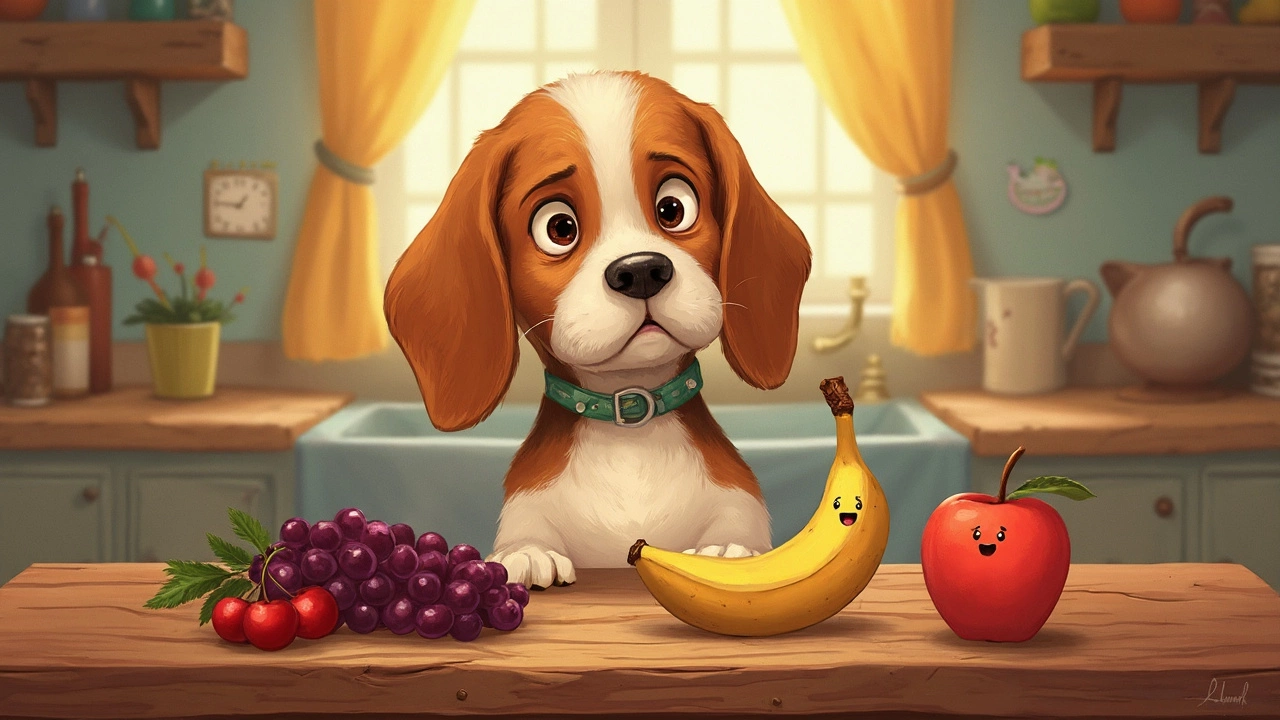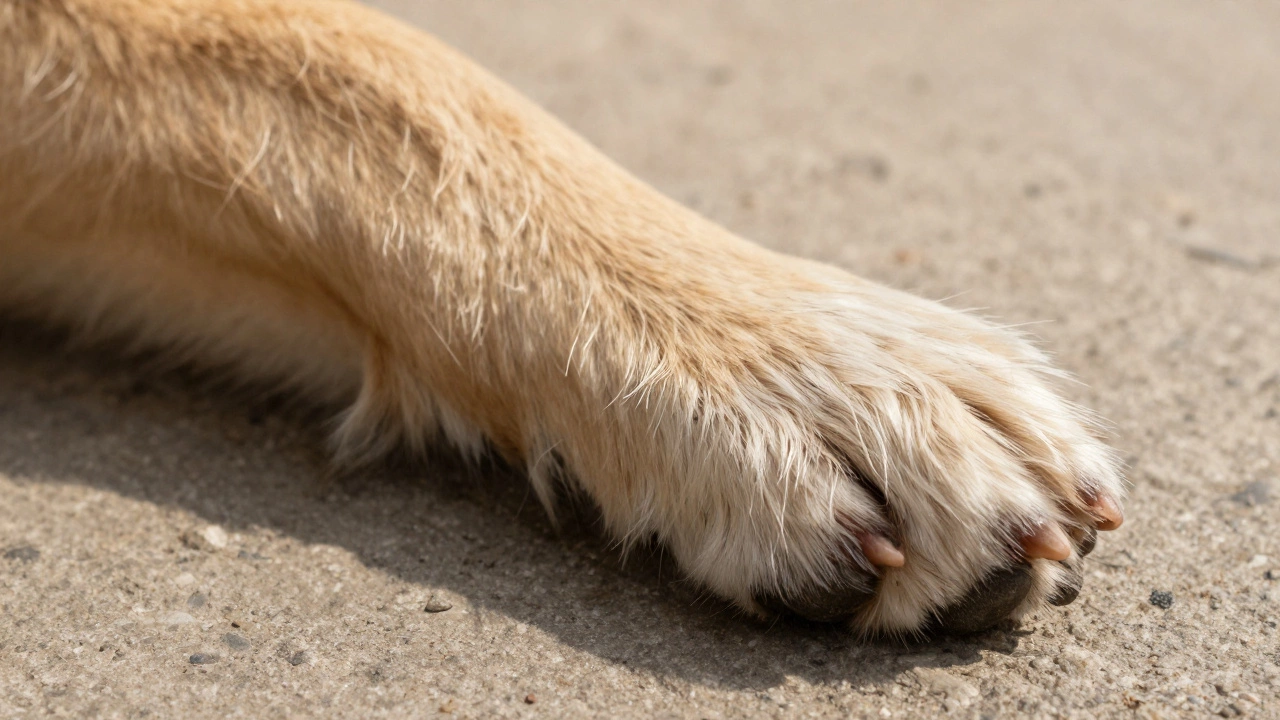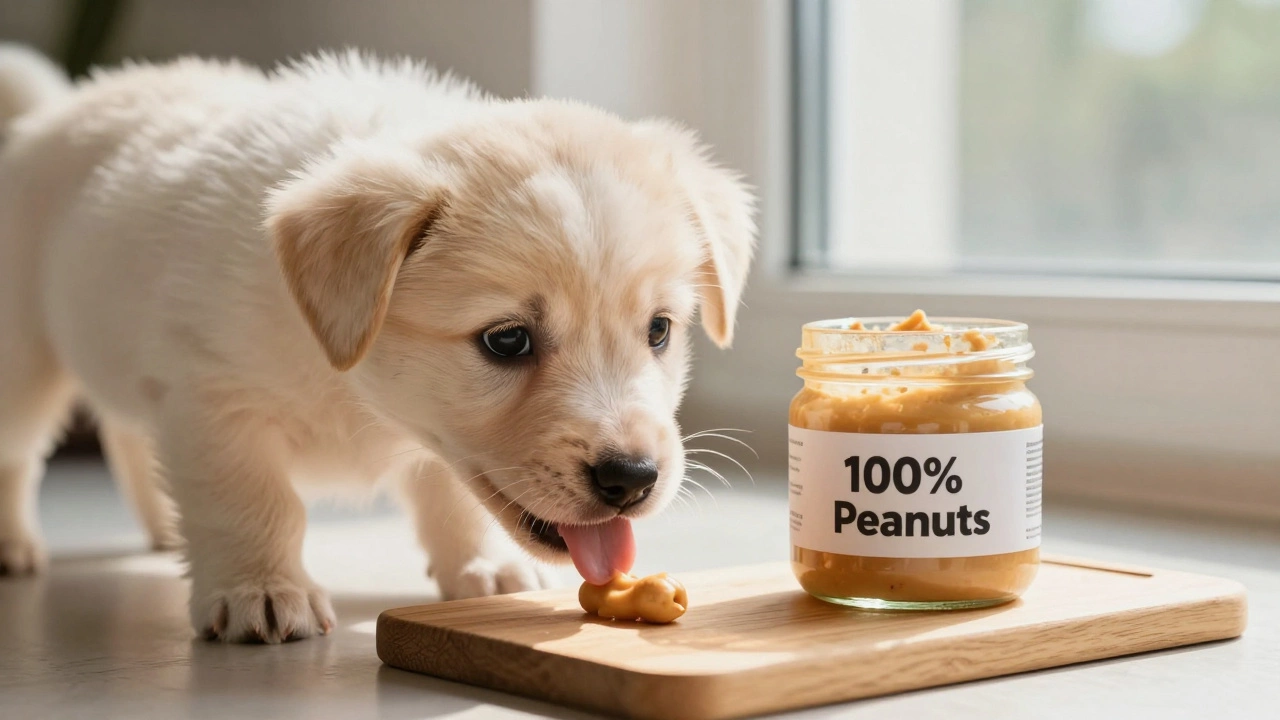Alright, so you’re thinking, “Hey, fruits are healthy, right?” Not always, if we're talking doggie diet. Some fruits may work wonders for us humans but can be a major no-go for our furry pals. It’s not as simple as a one-size-fits-all approach when it comes to our dogs’ health. Let’s get into the details about which fruits are on the naughty list for dogs.
First off, grapes and their dried version, raisins, are on a whole new level of 'must avoid'. Just a small quantity can cause serious problems, including kidney failure. Yep, it sounds dramatic, but that’s the reality!
- Understanding Why Some Fruits Are Dangerous
- The Big No-Nos: Grapes and Raisins
- Cherries, Citrus, and Other Threats
- Symptoms of Fruit Toxicity in Dogs
- Safe Alternatives and Treat Tips
Understanding Why Some Fruits Are Dangerous
So what's the big deal with feeding certain fruits to dogs? Well, it's all about what's inside and how a dog's body reacts. You see, fruits like grapes and raisins, for reasons not entirely understood by science yet, can cause kidney failure in dogs. It's wild, I know! Just think, something as innocent as a handful of grapes might be off-limits for Fido.
Next up, we have cherries. These little red delights might seem tempting to your pooch, but they come with a cyanide warning. The pits, stems, and leaves all contain cyanide—nasty stuff for anyone, especially your four-legged buddy. Chowing down on these parts can pose serious health risks.
Then there's citrus fruits like lemons and limes. While they aren't exactly toxic in small amounts, the citric acid in them can cause upset stomachs or worse when consumed in larger quantities. Dogs just aren't built to handle them like we are.
- Grapes and Raisins: Potential kidney failure.
- Cherries: Contain cyanide in their pits and stems.
- Citrus Fruits: Can lead to stomach upset.
If you're asking, why risk it? That's a smart question. Knowing which fruits can harm your dog helps you keep them safe and sound. So when in doubt, it's best to err on the side of caution and stick to treats known to be dog-friendly.
The Big No-Nos: Grapes and Raisins
So, what’s the deal with grapes and raisins? For some mysterious reason, they’ve turned into quite a bit of a horror show when it comes to dog health. You might be munching on a handful, thinking about sharing a piece or two with your pup. Stop right there!
Both grapes and raisins have been linked to severe kidney damage in dogs. The exact cause of this toxicity isn’t fully understood yet, but the result can be scary. In some cases, even a small amount can lead to sudden kidney failure.
Let’s break down what can happen if your pup eats them: Vomiting is usually the first sign, often within just a few hours after digestion. It might not seem related at first, but the symptoms progress. Lethargy, diarrhea, and a lack of appetite can follow. Worst case? It might lead to totally shutting down the kidneys.
Heard of cases where one pup eats a whole bag of raisins and walks away fine while another just sniffs one and gets really sick? Yeah, it’s that unpredictable. Better safe than sorry, right?
If you ever suspect your dog has polished off some grapes or raisins, call the vet immediately. They might advise you to induce vomiting if it happened recently.
Here’s a quick look at what vets typically observe:
| Symptom | Time After Ingestion |
|---|---|
| Vomiting | 2-6 hours |
| Lethargy | 6-12 hours |
| Kidney Failure | 2-4 days |
Keeping harmful fruits like these out of reach is key. Reach for safer snacks instead, like carrots or small apple slices. Your pup will be happier and you’ll dodge a potential emergency vet visit.
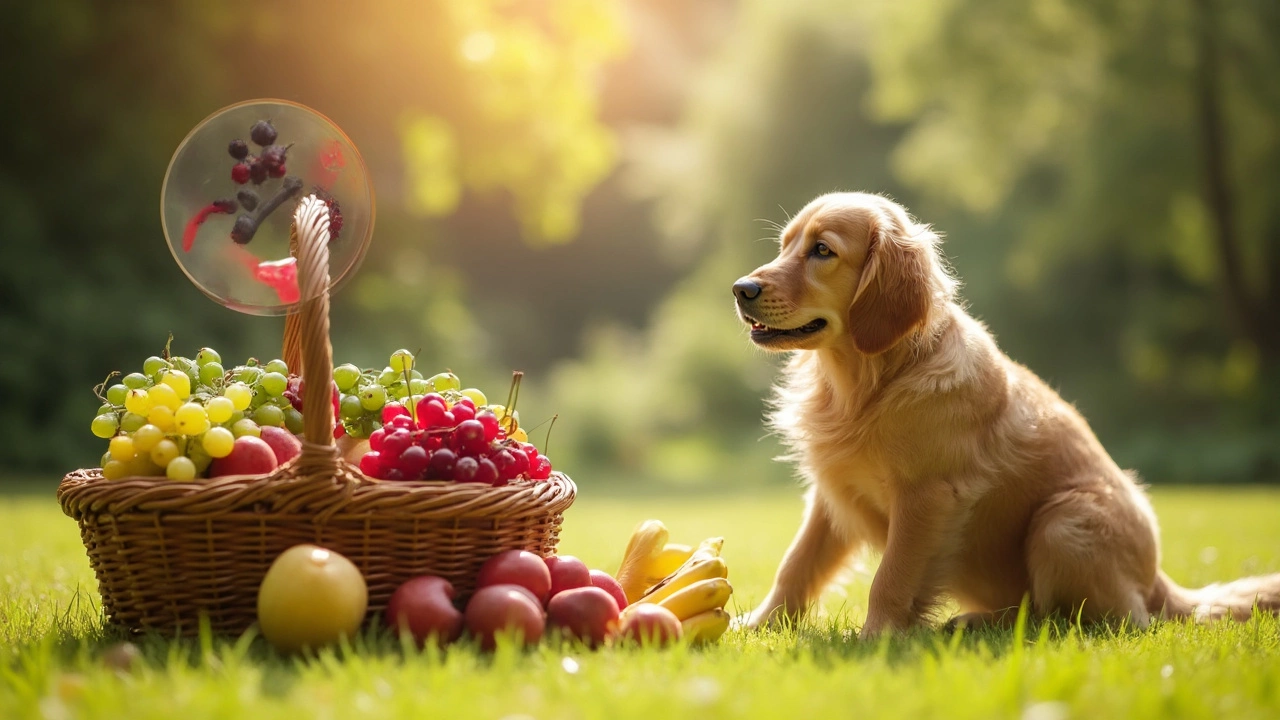
Cherries, Citrus, and Other Threats
Believe it or not, those bright red cherries that look so appealing can be troublemakers for your pooch. The real issue lies in the pits, stems, and leaves, which contain cyanide. Yep, that’s the same stuff you hear about in mystery novels. Even in small amounts, it can cause digestive upsets or worse for dogs.
Moving on to citrus fruits like oranges, lemons, and limes—they’re mostly alright in very small doses. But too much can mess with your dog's digestive system, leading to stomach pains and diarrhea. Not exactly the energy booster you're hoping for, huh?
Then there’s the skin and pith, which can be especially irritating. The high acid content in citrus can cause problems too, so it’s best to keep these to an occasional bite-sized treat if you’re really insistent.
Other fruits like persimmons and apricots also have their downsides. Persimmons can cause digestive blockages because of their seeds, while apricot pits have the same cyanide issue as cherries. It's worth mentioning that even fruit that’s safe can be bad news if given too much. Everything in moderation!
When it comes to these harmful fruits for dogs, it’s important to keep them out of reach. Consider other snacks or discuss with your vet for safer, dog-friendly alternatives. Your pup is counting on you to make the choices that keep them healthy and tail-wagging happy!
Symptoms of Fruit Toxicity in Dogs
So, you might be wondering, how can you tell if your dog accidentally had some forbidden fruit? Recognizing the symptoms early can make all the difference. The signs of fruit toxicity can vary depending on the type of fruit and the amount your dog consumed.
One of the most common symptoms to look out for is vomiting. If your pup starts puking and you've recently fed them something fruity, that’s a big red flag. Diarrhea is another symptom you don't want to ignore. It might clear up on its own, but if it sticks around, it's time to see the vet.
- Lethargy: This is more than just your dog taking a nap. It’s when your normally bouncy furball doesn’t want to get up and move.
- Lack of Coordination: If your dog seems dizzy or is stumbling, they might be experiencing fruit toxicity.
- Tremors or Seizures: These are more severe symptoms that require immediate veterinary attention.
- Excessive Thirst and Urination: This can be a sign of kidney trouble, especially alarming if you suspect grape ingestion.
In rare cases, some dogs might also exhibit difficulty breathing or abdominal pain. If you spot any of these symptoms, it’s not the time to procrastinate. Get your pooch to the vet pronto! Quick action can prevent these symptoms from turning into something more serious.
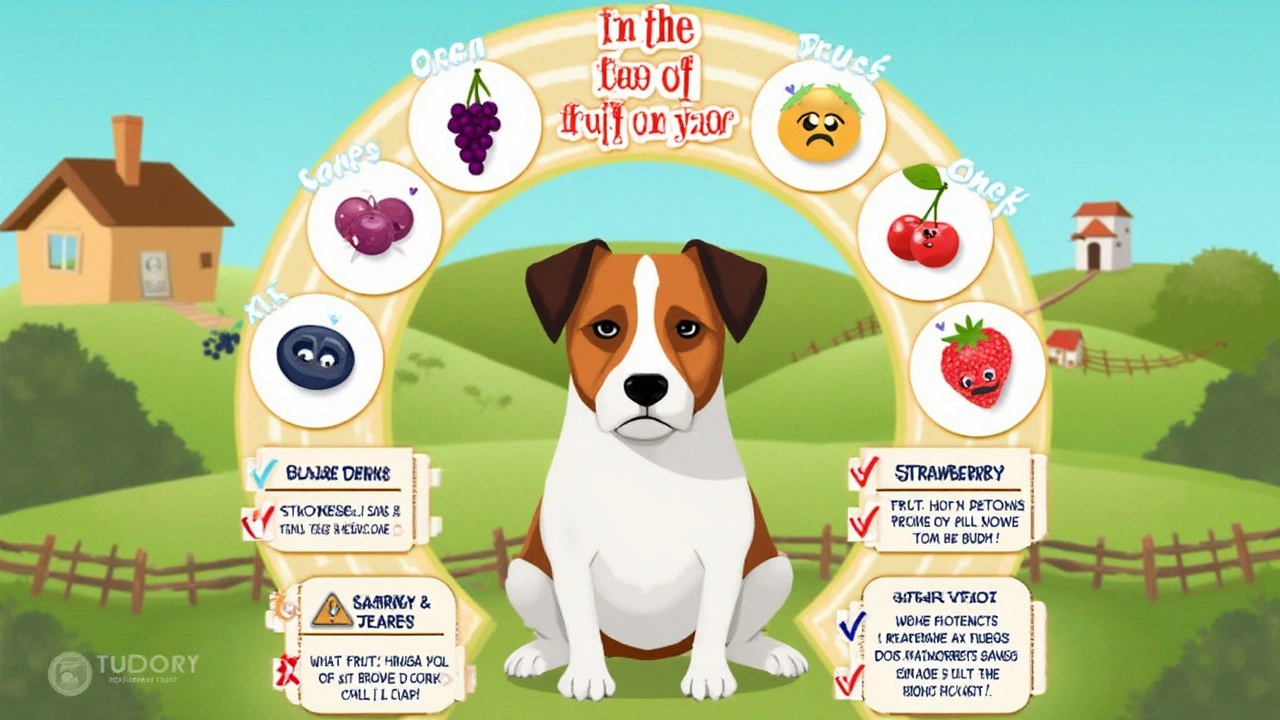
Safe Alternatives and Treat Tips
Alright, we’ve figured out what to avoid, but what about safe snacks? Lucky for us, there are plenty of safer alternatives that our dogs can enjoy without a worry. Let’s get into some fruits and tips that'll have your furry friend wagging their tail in delight!
First up, apples are a solid choice, but remember to skip the seeds and core. They're great for a crunchy treat. Slice them up and you’ve got a low-cal snack with tons of vitamins. Bananas, in moderation, are another favorite. They're soft and easy on canine tummies, with potassium that's good for them too.
How about berries? Blueberries, strawberries, and raspberries are not only safe, but they’re also full of antioxidants. Just wash them properly and don’t go overboard. Next time you’re making a smoothie for yourself, toss a few their way!
Can’t forget about the super hydrating watermelon. It's a summer hit, but just make sure you ditch the seeds and rind. A little cube or two is refreshing. Same goes for cantaloupe, but moderation is key due to their natural sugar content.
- Apples (remove core and seeds)
- Bananas
- Blueberries
- Strawberries
- Watermelon (seedless)
Now, let's talk serving size. Just because it’s safe doesn’t mean they should munch all they want. Keep the servings small, like you'd give treats, not meals. Too much could lead to an upset stomach, and those puppy eyes don't need that!
Here’s a quick tip: Make doggy popsicles! Mash some banana or a combo of their favorite safe fruits with some plain yogurt, spoon them into ice cube trays, and freeze. Voilà, a tasty, refreshing treat for hot days!
Lastly, when in doubt, stick to specially formulated dog treats. They're designed with their dietary needs in mind and eliminate any guesswork. Remember, keeping our furry friends healthy and happy is what it’s all about, whether it’s treat tips or everyday care.

